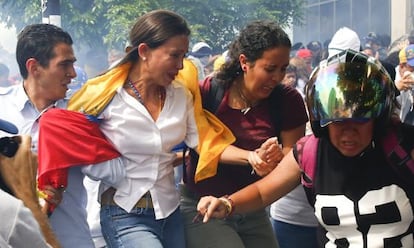Protestors and police clash as ousted Venezuelan deputy tries to retake her seat
President Maduro pleads with American people to ask their leaders to vote against sanctions

Police in Caracas on Tuesday fired tear gas and rubber bullets at large groups of demonstrators who had accompanied opposition leader María Corina Machado to the National Assembly to try to take her seat after a Supreme Court order had expelled her as a deputy there.
National Guard troops and police surrounded the capitol in downtown Caracas as lawmakers began meeting for their ordinary session.
Machado, who says her expulsion is illegal, has maintained that she will fight to keep her seat by appealing the Supreme Court's order and taking her petition to international forums.
“I come here to speak to you as a Venezuelan, as a mother and as an elected deputy,” she told thousands of supporters who came to meet her at Brión square in east Caracas before trying to march to the capitol.
She said the government, the legislature and judiciary – whose bench members were appointed by the late President Hugo Chávez – were working in cahoots against her and the opposition while “obeying orders coming from a foreign power, Cuba.”
On Monday, the Supreme Court ruled that Machado broke the law by taking a seat with the Panamanian delegation at a March 21 meeting of the Organization of American States (OAS) where she had tried to discuss the social and economic crises in Venezuela. According to the court, an elected National Assembly member cannot accept a position with a foreign government.
Machado and her aides were caught in the burning smoke and were forced to flee
Just days before the ruling, National Assembly speaker Diosdado Cabello announced that Machado would no longer be able to take her seat on the floor.
The ruling clears the way for the opposition deputy – who received the most votes of any other National Assembly member at the last election – to lose her parliamentary immunity and face trial on government charges that she has helped foment the two-month violence that has claimed at least 39 lives and injured more than 600 others.
On Tuesday, riot police holding shields kept the demonstrators from marching from Brión square, which is located in the affluent Chacaíto district, towards downtown.
After a scuffle with several demonstrators who demanded to be allowed to march through, officers began firing tear gas canisters toward the crowds. Machado and several of her aides were caught in the burning smoke and were forced to flee.
Masked demonstrators then began throwing rocks and bottles at police and attacked an armored vehicle that had moved in to clear the crowds.
In an op-ed column entitled "Venezuela: A call for peace" published in The New York Times, President Nicolás Maduro wrote that the protestors’ goal was “the unconstitutional ouster of the democratically elected government.”
“Let’s not forget that some of those who supported the 2002 coup in Venezuela are leading the protests today”
He said the foreign media and others have “distorted” the events taking place in his country over the past two months, and that those with “legitimate criticisms of economic conditions or the crime rate are being exploited by protest leaders with a violent, antidemocratic agenda.”
“Antigovernment protestors have physically attacked and damaged healthcare clinics, burned down a university in Táchira State and thrown Molotov cocktails and rocks at buses. They have also targeted other public institutions by throwing rocks and torches at the offices of the Supreme Court, the public telephone company CANTV and the attorney general’s office. These violent actions have caused many millions of dollars’ worth of damage. This is why the protests have received no support in poor and working-class neighborhoods,” Maduro wrote.
Saying that he supports dialogue, the Venezuelan leader also accused the United States of supporting and financing the protestors.
“Let’s not forget that some of those who supported ousting Venezuela’s democratically elected government in 2002 are leading the protests today,” he said. “The American government supported the 2002 coup and recognized the coup government despite its anti-democratic behavior. Today, the Obama administration spends at least $5 million annually to support opposition movements in Venezuela. A bill calling for an additional $15 million for these anti-government organizations is now in Congress.”
The Venezuelan president called on Americans to contact their representatives and senators and ask them to vote against imposing sanctions on Venezuela. “I hope that the American people, knowing the truth, will decide that Venezuela and its people do not deserve such punishment…,” he said.
Tu suscripción se está usando en otro dispositivo
¿Quieres añadir otro usuario a tu suscripción?
Si continúas leyendo en este dispositivo, no se podrá leer en el otro.
FlechaTu suscripción se está usando en otro dispositivo y solo puedes acceder a EL PAÍS desde un dispositivo a la vez.
Si quieres compartir tu cuenta, cambia tu suscripción a la modalidad Premium, así podrás añadir otro usuario. Cada uno accederá con su propia cuenta de email, lo que os permitirá personalizar vuestra experiencia en EL PAÍS.
En el caso de no saber quién está usando tu cuenta, te recomendamos cambiar tu contraseña aquí.
Si decides continuar compartiendo tu cuenta, este mensaje se mostrará en tu dispositivo y en el de la otra persona que está usando tu cuenta de forma indefinida, afectando a tu experiencia de lectura. Puedes consultar aquí los términos y condiciones de la suscripción digital.








































